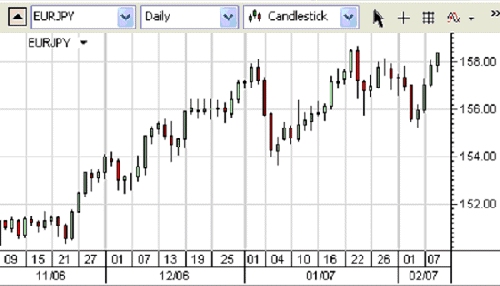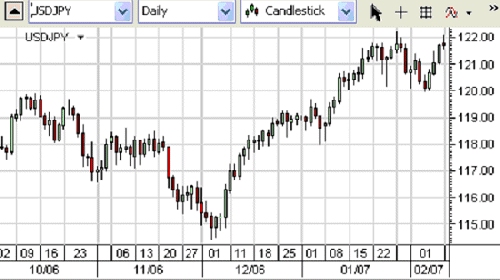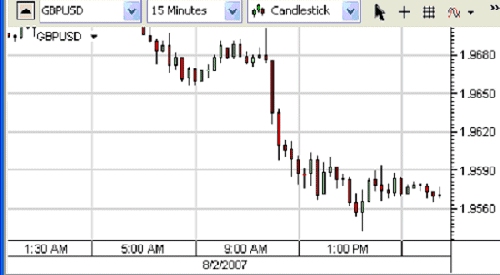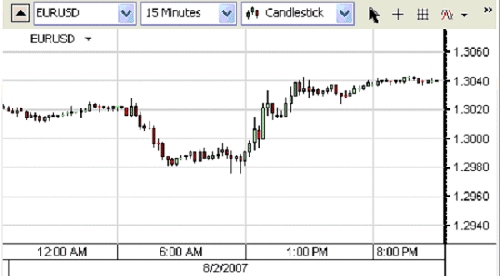Shorting the Japanese Yen has been one of the best and easiest Forex trades over the past six months. Japan's anemic benchmark interest rate of 0.25% makes it an easy target for the "carry trade", allowing Yen bears to collect interest on their trades. Banks, hedge funds and other traders have shorted JPY vs. higher yielding currencies such as the Great Britain Pound, the New Zealand Dollar, the Australian Dollar, and the Euro to take advantage of this interest rate differential. This has ignited a downtrend in the Yen, which has been exacerbated as these institutional traders add to their short positions. Fears that the Bank of Japan would embark on a campaign of interest rate hikes, which would make the carry trade less viable, has proved unfounded thus far.
Weakness in the Yen makes Japanese goods cheaper to overseas buyers, and boosts the sales and profits of Japanese exporters. As these goods become cheaper, competitors from the U.S., U.K., Europe, and elsewhere find it difficult to compete in the open market. Manufacturers from these countries then pressure their governments, which in turn pressure Japan to "do something" about the weak Yen.
And so the stage was set as we entered this past weekend's Group of Seven (G7) meeting. Would the G7 countries shine a spotlight on Japan and the weak Yen? Would there be a call for action to strengthen the Yen, or a change to the official G7 statement?
In a word, no. Sure, there were comments that warned of the dangers of the weak Yen, especially from European officials, who have been particularly vocal about the potential damage that their economies may suffer due to weak demand for European exports.
The official G7 statement warned traders that Japan's economy is "on track". The statement implies that the Yen should not be weak because the Japanese economy is not weak. The President of the European Central Bank, Jean-Claude Trichet, tried to "jawbone" the currency markets, suggesting that the carry trade is dangerous. "One-way bets in the present circumstances would not be, it seems to us, appropriate. We want the markets to be aware of the risks they contain," he said.
Does this mean that Trichet is suddenly a currency trader's best friend, looking out for our best interests and protecting us from risky trades? Of course not, he is simply doing his best to create strength in the Yen, which is in the best interest of Europe. Judging from the currency market's reaction to the G7 statement and comments, he has not succeeded.
Far from being frightened by the sounds emanating from Trichet and other officials, currency traders are emboldened by the failure of the G7 to act on the Yen in any meaningful way. Despite the intention of the statement, it is being interpreted as a green light to resume shorting the beleaguered currency. In fact, soon after the conclusion of the meeting, the Euro/ Japanese Yen currency pair (EUR/JPY) was trading well above 158.00, just a few pips below its eight-year high (see figure 1).

caption: Figure 1: EUR/JPY tests multi-year highs just after conclusion of the G7 meeting Source: Saxobank.com.
The damage was widespread, as even the U.S. Dollar flexed its muscle against the woeful Yen. The USD/JPY pair floated just below 122.00, which last week was breached for the first time in over four years (see figure 2).

caption: Figure 2: USD/JPY trades near last week's high, which represents a new four-year high. Source: Saxobank.com.
Instead of Japan, the G7 focused its attention on everyone's favorite easy target, China, calling on that country to increase the flexibility of its currency. This only serves to highlight the impotence of the G7; China manipulates its currency, and everyone knows it, yet the G7 is powerless to stop it.
China and Japan are in completely different situations. The Bank of Japan hasn't directly intervened in the currency markets since early 2004, as it does on occasions when it believes the Yen is too strong. Sure, the Europeans and others are crying about the weak Yen, but what do they expect Japan to do about it? Do they want Japan to interfere with free and open markets? Unlike the Chinese Yuan, the Yen is not weak because of a government policy. The Japanese Yen is weak because the market says it should be weak. Perhaps Trichet and other officials would disagree, but good traders know better than to argue with the currency market. The market is always right, only we have the capacity to be wrong.
A Tale of Two Banks
On Thursday, February 8th, two major central banks decided to hold the line on interest rates. The two underlying currencies reacted in very different ways; the currency of one country fell, while the other rose. Why did this happen, and how could Forex traders benefit from this information?
First, at 7:00 am New York time, the Bank of England (BoE), which determines the interest rate policy for the United Kingdom, held rates steady at 5.25%. The British Pound responded by falling nearly 100 pips vs. the U.S. Dollar over the next hour (see figure 3).

caption: Figure 3: GBP/USD tumbles after Bank of England rate decision. Source: Saxobank.com
When the European Central Bank also decided not to raise rates just forty-five minutes later, the Euro strengthened anyway. Euro climbed to the upper end of its recent range vs. the U.S. dollar, to the area near 1.3040 (see figure 4).

caption: Figure 4: EUR/USD rallies after Trichet speech. Source: Saxobank.com.
Why did two similar decisions result in two very different reactions? The answer lies in the expectations of traders. The Bank of England offers little forward guidance regarding its decision making process, and last month the central bank shocked the currency markets by unexpectedly raising rates to 5.25%. Since the BoE speaks softly and carries a big stick, some traders undoubtedly had placed bets that the U.K. central bank would raise rates once again last week. When these expectations were not met, the British currency suffered.
While some traders clearly anticipated another move from the Bank of England, no such expectation existed for the European Central Bank. This is because of Jean-Claude Trichet's skillful management of expectations; Trichet sends clear signals regarding future rate hikes. While the Euro didn't rise immediately after the decision, it rocketed higher when Trichet gave a speech less than an hour later.
What did the European Central Bank (ECB) President say to excite the markets and propel the Euro? Trichet's comment that the ECB would remain "strongly vigilant" against inflation was taken as a clear signal that a rate hike would come soon, probably at the next policy meeting in March. "Vigilant" has become a sort of code word that is used to signal the ECB's intention to raise rates, and if that word had not appeared in Trichet's speech, the Euro most likely would not have rallied.
Now that Trichet has given the signal, a rate hike at next month's meeting is considered a done deal. The focus will now shift to the speech that will follow that decision - a speech that will signal the ECB's next move. At that time, the Euro will move based not just on the rate decision itself, but on the future expectations as signaled by Trichet during his subsequent speech.
Weakness in the Yen makes Japanese goods cheaper to overseas buyers, and boosts the sales and profits of Japanese exporters. As these goods become cheaper, competitors from the U.S., U.K., Europe, and elsewhere find it difficult to compete in the open market. Manufacturers from these countries then pressure their governments, which in turn pressure Japan to "do something" about the weak Yen.
And so the stage was set as we entered this past weekend's Group of Seven (G7) meeting. Would the G7 countries shine a spotlight on Japan and the weak Yen? Would there be a call for action to strengthen the Yen, or a change to the official G7 statement?
In a word, no. Sure, there were comments that warned of the dangers of the weak Yen, especially from European officials, who have been particularly vocal about the potential damage that their economies may suffer due to weak demand for European exports.
The official G7 statement warned traders that Japan's economy is "on track". The statement implies that the Yen should not be weak because the Japanese economy is not weak. The President of the European Central Bank, Jean-Claude Trichet, tried to "jawbone" the currency markets, suggesting that the carry trade is dangerous. "One-way bets in the present circumstances would not be, it seems to us, appropriate. We want the markets to be aware of the risks they contain," he said.
Does this mean that Trichet is suddenly a currency trader's best friend, looking out for our best interests and protecting us from risky trades? Of course not, he is simply doing his best to create strength in the Yen, which is in the best interest of Europe. Judging from the currency market's reaction to the G7 statement and comments, he has not succeeded.
Far from being frightened by the sounds emanating from Trichet and other officials, currency traders are emboldened by the failure of the G7 to act on the Yen in any meaningful way. Despite the intention of the statement, it is being interpreted as a green light to resume shorting the beleaguered currency. In fact, soon after the conclusion of the meeting, the Euro/ Japanese Yen currency pair (EUR/JPY) was trading well above 158.00, just a few pips below its eight-year high (see figure 1).

caption: Figure 1: EUR/JPY tests multi-year highs just after conclusion of the G7 meeting Source: Saxobank.com.
The damage was widespread, as even the U.S. Dollar flexed its muscle against the woeful Yen. The USD/JPY pair floated just below 122.00, which last week was breached for the first time in over four years (see figure 2).

caption: Figure 2: USD/JPY trades near last week's high, which represents a new four-year high. Source: Saxobank.com.
Instead of Japan, the G7 focused its attention on everyone's favorite easy target, China, calling on that country to increase the flexibility of its currency. This only serves to highlight the impotence of the G7; China manipulates its currency, and everyone knows it, yet the G7 is powerless to stop it.
China and Japan are in completely different situations. The Bank of Japan hasn't directly intervened in the currency markets since early 2004, as it does on occasions when it believes the Yen is too strong. Sure, the Europeans and others are crying about the weak Yen, but what do they expect Japan to do about it? Do they want Japan to interfere with free and open markets? Unlike the Chinese Yuan, the Yen is not weak because of a government policy. The Japanese Yen is weak because the market says it should be weak. Perhaps Trichet and other officials would disagree, but good traders know better than to argue with the currency market. The market is always right, only we have the capacity to be wrong.
A Tale of Two Banks
On Thursday, February 8th, two major central banks decided to hold the line on interest rates. The two underlying currencies reacted in very different ways; the currency of one country fell, while the other rose. Why did this happen, and how could Forex traders benefit from this information?
First, at 7:00 am New York time, the Bank of England (BoE), which determines the interest rate policy for the United Kingdom, held rates steady at 5.25%. The British Pound responded by falling nearly 100 pips vs. the U.S. Dollar over the next hour (see figure 3).

caption: Figure 3: GBP/USD tumbles after Bank of England rate decision. Source: Saxobank.com
When the European Central Bank also decided not to raise rates just forty-five minutes later, the Euro strengthened anyway. Euro climbed to the upper end of its recent range vs. the U.S. dollar, to the area near 1.3040 (see figure 4).

caption: Figure 4: EUR/USD rallies after Trichet speech. Source: Saxobank.com.
Why did two similar decisions result in two very different reactions? The answer lies in the expectations of traders. The Bank of England offers little forward guidance regarding its decision making process, and last month the central bank shocked the currency markets by unexpectedly raising rates to 5.25%. Since the BoE speaks softly and carries a big stick, some traders undoubtedly had placed bets that the U.K. central bank would raise rates once again last week. When these expectations were not met, the British currency suffered.
While some traders clearly anticipated another move from the Bank of England, no such expectation existed for the European Central Bank. This is because of Jean-Claude Trichet's skillful management of expectations; Trichet sends clear signals regarding future rate hikes. While the Euro didn't rise immediately after the decision, it rocketed higher when Trichet gave a speech less than an hour later.
What did the European Central Bank (ECB) President say to excite the markets and propel the Euro? Trichet's comment that the ECB would remain "strongly vigilant" against inflation was taken as a clear signal that a rate hike would come soon, probably at the next policy meeting in March. "Vigilant" has become a sort of code word that is used to signal the ECB's intention to raise rates, and if that word had not appeared in Trichet's speech, the Euro most likely would not have rallied.
Now that Trichet has given the signal, a rate hike at next month's meeting is considered a done deal. The focus will now shift to the speech that will follow that decision - a speech that will signal the ECB's next move. At that time, the Euro will move based not just on the rate decision itself, but on the future expectations as signaled by Trichet during his subsequent speech.
Last edited by a moderator:
